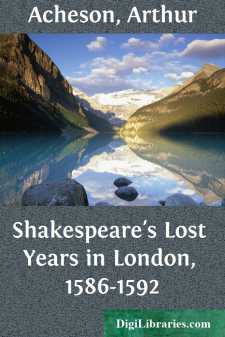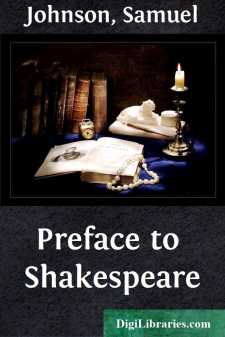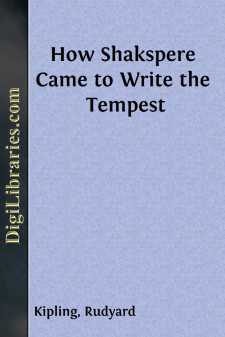Literary Criticism
- American 18
- Ancient and Classical 3
- Asian 1
- Australian & Oceanian 1
- Books & Reading 8
- Caribbean & Latin American 2
- Drama 2
- English, Irish, Scottish, Welsh 49
- European 7
- General 37
- Horror 1
- Humor 2
- Jewish 2
- Medieval 2
- Middle Eastern 3
- Poetry 7
- Renaissance 6
- Russian & Former Soviet Union 1
- Shakespeare
Shakespeare Books
Sort by:
by:
Arthur Acheson
CHAPTER I INTRODUCTORY The most interesting and important fifteen years in the records of English dramatic literature are undoubtedly those between 1588 and 1603, within which limit all of Shakespeare's poems and the majority of his plays were written; yet no exhaustive English history, intelligently co-ordinating the social, literary, and political life of this period, has ever been written....
more...
I. Insomnia, the lack of "tired Nature's sweet restorer," is rapidly becoming the chronic terror of all men of active life who have passed the age of thirty-five or forty years. In early life, while yet he "wears the rose of youth upon him," man rarely, except in sickness, knows the want of sound, undreaming sleep. But as early manhood is left behind and the cares and perplexities...
more...
PREFACE When I was invited to reprint in book-form the articles which had appeared in the Genealogical Magazine under the titles of "Shakespeare's Family" and the "Warwickshire Ardens," I carefully corrected them, and expanded them where expansion could be made interesting. Thus to the bald entries of Shakespeare's birth and burial I added a short life. Perhaps never before...
more...
INTRODUCTION. When a small impression of these quaint old books issued from the Chiswick Press, many years ago, under the auspices of the late Mr. S. W. Singer, that gentleman merely designed the copies struck off for presentation to a select circle of literary friends who, like himself, felt a warm interest in every relic of the past which helped to illustrate Shakespeare and ancient English manners....
more...
SHAKESPEARE AND PRECIOUS STONES So wide is the range of the immortal verse of Shakespeare, and so many and various are the subjects he touched upon and adorned with the magic beauty of his poetic imagery, that it will be of great interest to refer to the allusions to gems and precious stones in his plays and poems. These allusions are all given in the latter part of this volume. What can we learn from...
more...
by:
Samuel Johnson
PREFACE TO SHAKESPEARE That praises are without reason lavished on the dead, and that the honours due only to excellence are paid to antiquity, is a complaint likely to be always continued by those, who, being able to add nothing to truth, hope for eminence from the heresies of paradox; or those, who, being forced by disappointment upon consolatory expedients, are willing to hope from posterity what...
more...
by:
Samuel Johnson
TRAGEDIES Vol. IV (392) Most of the notes which the present editor has subjoined to this play were published by him in a small pamphlet in 1745. I.i (393,*) Enter three Witches] In order to make a true estimate of the abilities and merit of a writer, it it always necessary to examine the genius of his age, and the opinions of his contemporaries. A poet who should now make the whole action of his...
more...
by:
Samuel Johnson
Dr. Johnson's Preface to Shakespeare is one of the most famous critical essays of the eighteenth century, and yet too many students have forgotten that it is, precisely, a preface to the plays of Shakespeare, edited by Dr. Johnson himself. That is to say, the edition itself has been obscured or overshadowed by its preface, and the sustained effort of that essay has virtually monopolized scholarly...
more...
by:
Mark Twain
CHAPTER I Scattered here and there through the stacks of unpublished manuscript which constitute this formidable Autobiography and Diary of mine, certain chapters will in some distant future be found which deal with “Claimants”—claimants historically notorious: Satan, Claimant; the Golden Calf, Claimant; the Veiled Prophet of Khorassan, Claimant; Louis XVII., Claimant; William Shakespeare,...
more...
by:
Rudyard Kipling
INTRODUCTION Mr. Kipling’s brilliant reconstruction of the genesis of the ‘Tempest’ may remind us how often that play has excited the creative fancy of its readers. It has given rise to many imitations, adaptations, and sequels. Fletcher copied its storm, its desert island, and its woman who had never seen a man. Suckling borrowed its spirits. Davenant and Dryden added a man who had never seen a...
more...











